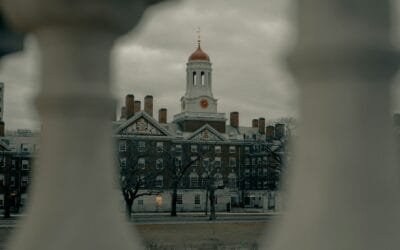You may have heard of Critical Legal Studies in connection with a 1988 faculty rumble at Harvard. What is Critical Legal Studies?
Critical Legal Studies is an avowedly political movement among law school professors. The politics: socialism. Critical Legal Studies officially started at a 1977 gathering of left-wing professors. Many hundreds now attend Critical Legal Studies’ annual conference. CLS is strongest at Harvard and Stanford Law Schools. As of February 1989, a quarter of Harvard’s tenured faculty were proponents of CLS.
The “Crits,” as they are called, rail the loudest about the “legitimating” effect of traditional legal principles, claiming that unjust structures of power and distributions of wealth result from those principles. As explained in one anti-Crit article: “For neo-Marxist radicals, after all, capitalist democracy is a miserable, oppressive, and alienating system; it is therefore puzzling to them that so many people in the West seem so satisfied with their lot. One popular explanation is that ideology (and here, law in particular) can ‘legitimate’ an oppressive system by inducing ‘false consciousness’ in the people.” Thus, according to the same article, the Crits believe that “law dampens revolutionary ardor by limiting the capacity to imagine alternative social structures.”
The Crits view traditional legal principles as totally subjective and arbitrary. “Rules of law do not have constraining force, because the rules mean only what those interpreting them want them to mean.”
With what do the Crits wish to replace traditional legal principles? Well, they’re not quite sure what the legal rules will be. One prominent Crit states: “The spirit of the anti-rights, anti-legalist approach is to abandon known distorting categories, to leap ahead, not fully aware how one will reconstruct the world.” They are sure, however, that the guiding light will be socialism. One leading Crit writer says that if he were on the Supreme Court he would, simply, promote socialism. What concrete actions are suggested? Here are two examples: Students should infiltrate corporate law firms “to confront, outflank, sabotage, or manipulate the bad guys,” and janitors and law professors should exchange jobs every six months. (It has been observed that no Crit has volunteered to go first with respect to this last suggestion.)
None of this, of course, is new. It may be a consequence of the coming-of-age of law professors who grew up in the Sixties. Nor is there anything new about the quality of the
opposition. The National Review attacks the Crits on the ground that traditional legal principles are “popularly supported” and “comport[ ] reasonably well with common moral standards and aspirations.” Similarly, Harvard Law School’s new dean, Robert Clark, whose appointment was viewed as a blow to the Crits, commented as follows:
Thoughtful legal scholars in other schools of thought are likely to agree that a major
function of legal discourse is to legitimate the legal system’s norms. It would be a
sorry and badly functioning legal system that did not try to legitimate a dominant
set of norms; and it is probably impossible to do this in any society without a fair
amount of myth-making and mumbo-jumbo. But this is different from contending,
or assuming, that our system’s rules are fundamentally unjust – as tested by some
supposedly transcendent set of values or ideals – and that its mythologizing and
legitimating efforts are fundamentally evil.
So much for any principled opposition. TAFOL will keep an eye out for notable developments.
Copyright © The Association for Objective Law. All rights reserved. Republished in Capitalism Magazine by permission of TAFOL.










